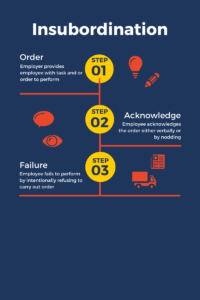Insubordination occurs when an employee fails to perform a lawful and reasonable order from their employer. It is different from a simple misunderstanding or miscommunication in that it is an intentional refusal by the employee to carry out the task. A simple task, such as refusing to fill out a time sheet at the end of a shift, can be seen as insubordination.
Insubordination can become a serious issue in an organization as it undermines the authority of management, which disrupts work and can create a toxic work environment. It is up to management to provide a safe work environment for all employees. Employers should take disciplinary action and even termination if an employee’s insubordination is persistent.
Types of insubordination
There are different ways that insubordination manifests itself at a work. An employee may be insubordinate if they perform one or more of the following:
- Refusal to perform a lawful and reasonable order provided by employer
- Disrespecting superiors with vulgar language, mockery, or intimidation
- Questioning and mocking management decisions
Employee insubordination results in undermining the authority of a superior, which ultimately disrupts the workplace, creates a negative corporate culture, and destroys necessary hierarchical structures. Address insubordination as soon as it arises to reduce the impact it may have on the organization.
When does insubordination occur?
The most common form of insubordination is an employee refusing to perform a task assigned by an employer. Insubordination has occurred if the incident contains the three steps:

For example, you are a manager of a sales team and you ask one of your team members to complete a sales report by Friday. Your team member acknowledges your request. You get into the office on Monday and have not received the report. When you ask the team member about the report, they indicate that they did not complete it simply because they did not want to. Their refusal to complete the task is considered insubordination.
Always check with the employee to understand exactly why they didn’t complete the task. If there is a misunderstanding or the employee felt unsafe performing the task, or deemed the action illegal and or unethical, then the employee’s refusal is not considered insubordination.
How should I handle an insubordinate employee?
When managing teams and or groups of individual contributors, there is always the risk of insubordination. Addressing insubordination as soon as it occurs is imperative in realigning the employee with the organizational goals and driving the desired corporate culture. In all cases of insubordination, it is recommended that the following steps be taken:
- Talk to the employee – this is an important first step to understanding why the insubordination occurred. Maybe there is a misunderstanding, or the employee did not feel safe carrying out the task. Having the conversation may provide insight into why it occurred and serves as a coaching opportunity.
- Document the incident – documenting the incident will be helpful if insubordination is reoccurring and persistent. They service as data points in future discussions about pay increases, disciplinary action, and or termination.
- Develop a plan for moving forward – work with the employee to identify a path for moving forward. Be clear with what is acceptable behaviour and what is expected of the employee.
- Terminate – when all else fails and or the insubordination is persistent and or was performed in bad faith, it may be necessary to terminate the employee.
- Remain professional – regardless of the nature of the incident, it is important to maintain a professional and composed manner when dealing with an insubordinate employee. This sets as an example for other employees of what respect needs to look like, regardless of the situation.
Most organizations do not hire individuals with the expectation that they will become insubordinate. However, over the course of an employee’s journey with an organization, numerous things can happen that can lead to insubordination. Organizations should ensure that they have policies and procedures in place for the kind of safe work environment an employee can expect, what is considered as insubordination (e.g. use of vulgar language), and what disciplinary action will be taken.
Being Practical – Balance Between Culture and Insubordination
In creating a corporate culture that encourages diversity of opinion and thought, managers may experience incidents where it is not clear that insubordination has occurred. A prime example of this is where to draw the line between cursing as part of “shop talk” versus cursing used to disrespect a fellow employee. In some cases, excessive use of vulgar and or abusive language may be exhibited by your highest performers, making disciplinary action or termination undesirable options.
To strike the right balance, companies should ask themselves the following questions:
- What is the desired corporate culture that will support the organization’s strategic goals?
- What is the emerging corporate culture and how close does that align with the desired?
- Do we hire and promote the individuals who match our desired corporate culture?
- Does the company provide the type of environment that attracts the type of hires that I want?
By identifying the type of corporate culture the organization wants and needs to support the strategic goal, it can better define what they deem as acceptable behaviour and what is insubordination.
Key take-aways for employers
- Insubordination happens when there is an intended refusal by an employee to perform a task assigned by an employer
- Employees who do not perform a task due to a misunderstanding, and or refuse to perform a task because they feel it is unsafe or illegal cannot be found as insubordinate
- Culture is key – determine the type of corporate culture your organization needs to achieve its strategic goals in order to determine what types of behaviours your organization will find acceptable
